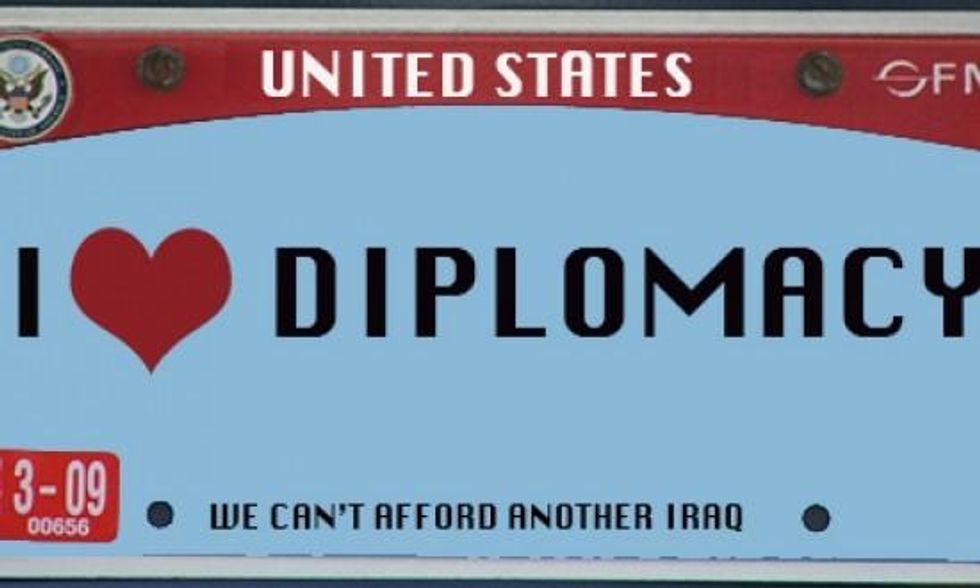The stakes are immense: Will the U.S. and Iran reach an agreement that can end the threat of a nuclear arms race in the volatile Middle East? Or will the U.S. go down the path toward another Middle East War?
The Obama administration and the new leadership of Iran have successfully negotiated a preliminary agreement concerning Iran's nuclear program. Over the next six months intensive negotiations will take place toward a final settlement. But even as voices across the globe have hailed these steps toward peace, powerful U.S. law-makers are taking steps that would undermine diplomacy, heightening tensions and the likelihood of military conflict.
Here are the top reasons why a grassroots upsurge is needed to support the negotiation process and say no to fear-mongering and war:
1) Negotiations put military "solutions", which solve nothing, in the background.
Continued negotiations and nuclear-facility inspections could result in a lessening of broad sanctions enacted against Iran since the 1990s, and would be a step away from military "solutions." A decade of bloody U.S.-led wars have brought death and destruction to the region, and resulted in the growth of terrorist networks rather than democracies in the Middle East and North Africa. After Iraq and Afghanistan one might think that Congress would feel pressure to act in accordance with U.S. and world opinion that wants a negotiated settlement around Iran's nuclear program. Instead, a vigilante attitude remains strong with lawmakers using hyperbolic language around the threat of an Iranian nuclear weapon. U.S. ally Israel also wants negotiations scuttled. Were Iran to abide by an international agreement on the nuclear issue, Israel would have less ability to call Iran a rogue state; less justification for its own arsenal of 200-plus nuclear weapons; and one less smokescreen for Israel's mistreatment of Palestinians.
2) We have the momentum of stopping U.S. military action in Syria behind us.
U.S. opinion is not with the Congressional hawks. This was shown in the anti-war sentiment that was voiced loudly when it seemed that military action in Syria was around the corner. Certainly, it was John Kerry's gaffe on chemical weapon destruction that conveniently allowed a Russian plan to take shape and for the U.S. government to walk away from the war rhetoric. But this was a loss for the hawks that wanted another "intervention", and opened up space for more discussion on the negative impact of U.S. actions in the region. Successful negotiations with Iran on top of preventing a U.S. strike in Syria would be a huge lift for the use of diplomacy rather than military force in conflict zones throughout the world.
3) U.S. people want support for their communities.
The feelings against war in the U.S. coincide with a desire for the government to take action on the economic woes that people are facing. Anti-war activists should be pushing for efforts to sustain the negotiations with Iran, while voicing the ways that our massive military budget steals resources from other programs (real or possible) that support peoples' individual lives and communities. As recent polling showed the U.S. public's feelings against today's wars are due to mixed motives: some Americans think all that matters are U.S. lives and don't care what happens to "them." But with war fever at an ebb, there are new chances to make headway against narrow-minded, racist and Islamophobic sentiments, and explain why U.S. military interventions are bad for us and the world.
The road to a nuclear-free Middle East, an end to the sectarian conflicts that are now gripping the region, and the flourishing of regional movements for democracy and equality will not come from increased sanctions and threats of war.
Raise your voice to support diplomacy with Iran today!
 The stakes are immense: Will the U.S. and Iran reach an agreement that can end the threat of a nuclear arms race in the volatile Middle East? Or will the U.S. go down the path toward another Middle East War?
The stakes are immense: Will the U.S. and Iran reach an agreement that can end the threat of a nuclear arms race in the volatile Middle East? Or will the U.S. go down the path toward another Middle East War?